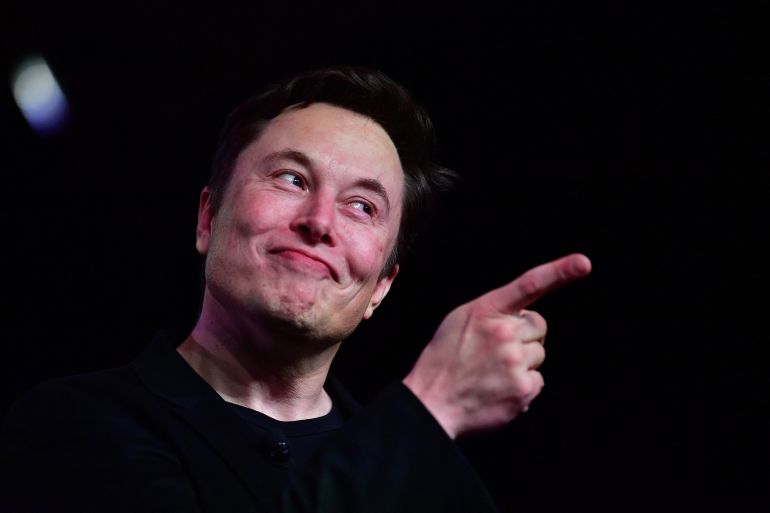Musk tells Twitter advertisers he wants to stop fake accounts
Musk sought to reassure advertisers –Twitter’s main source of revenue – as many have paused ads since his takeover.

Elon Musk has told advertisers he aims to turn Twitter into a force for truth and stop fake accounts, in an effort to assuage agencies increasingly backing away from the social media platform.
The new owner said on Wednesday that Twitter Blue subscriptions would become more prominent, which would have the effect of discouraging spammers, who would not want to pay for that service.
Keep reading
list of 3 itemsIs Musk’s Twitter ready for a surge in US midterm misinformation?
Tesla stock hits two-year low after boss Musk sells more shares
Days after Twitter rattled users and advertisers by cutting half its staff, more than 100,000 listeners tuned in to hear Musk speak on the platform’s Spaces feature. He was joined by Yoel Roth, Twitter’s head of safety and integrity, who has reassured users Twitter would uphold its policies against harmful content.
Musk, the world’s richest man, spoke calmly about his vision for Twitter, touting an $8 charge for premium subscriptions as a bot remedy and musing about the possibility of someday offering money-market accounts.
Big advertisers like General Motors and General Mills have pulled their ads off Twitter following concerns Musk could loosen content moderation rules on the service.
A coalition of civil rights groups has also ramped up pressure on Twitter’s advertisers, demanding they suspend ads globally after Musk laid off roughly half of the staff. Musk blamed the coalition for “a massive drop in revenue”.
Directly addressing brands who have paused their ads, Musk said: “I understand if people want to give it a minute.” But he added that “the best way to see how things are evolving is just use Twitter”.
Musk also responded to a question about his own tweets which have upset some advertisers, including one, now-deleted, that linked to a conspiracy theory about the attack on US House Speaker Nancy Pelosi’s husband, as well as a tweet that urged voters to choose Republican candidates in the US midterm elections.
“Twitter must be as a platform as neutral as possible. That doesn’t mean I’m completely neutral,” he said.
Musk has moved quickly to make changes in the Twitter app, creating some confusion. He said in a tweet on Wednesday he “killed” a new “official” label for Twitter accounts on the same day it had begun rolling out.
“Please note that Twitter will do lots of dumb things in coming months,” he tweeted. “We will keep what works & change what doesn’t.”
Flip-flop on ‘official’ label
The rollout earlier of the “official” labels appeared arbitrary, with some politicians, news outlets and well-known personalities getting the label and others not. In some cases, whether users could see an account’s “official” label appeared to depend on what country they were in.
Musk backtracked on the official label just a day after a product executive announced it, leading to confusion about the difference between the label and Twitter’s current blue check mark that signifies verified accounts.
The site’s system of using what are known as “blue checks” confirming an account’s authenticity will soon go away for those who do not pay a monthly fee. The checkmarks will be available at a yet-to-be-announced date for anyone willing to pay a $7.99-a-month subscription, which will also include some bonus features such as fewer ads and the ability to have tweets given greater visibility than those coming from non-subscribers.
The platform’s current verification system has been in place since 2009 and was created to ensure high-profile and public-facing accounts are who they say they are.
Experts have expressed concern that making the checkmark available to anyone for a fee could lead to impersonations and the spreading of misinformation and scams.
On the call with advertisers, Musk promised faster evolution of the Twitter service, opened the possibility of allowing peer-to-peer payments and said Twitter would allow free speech without amplifying hateful comments.
“There’s a big difference between freedom of speech and freedom of reach,” Musk said, meaning Twitter does not intend to increase the visibility of hateful content.